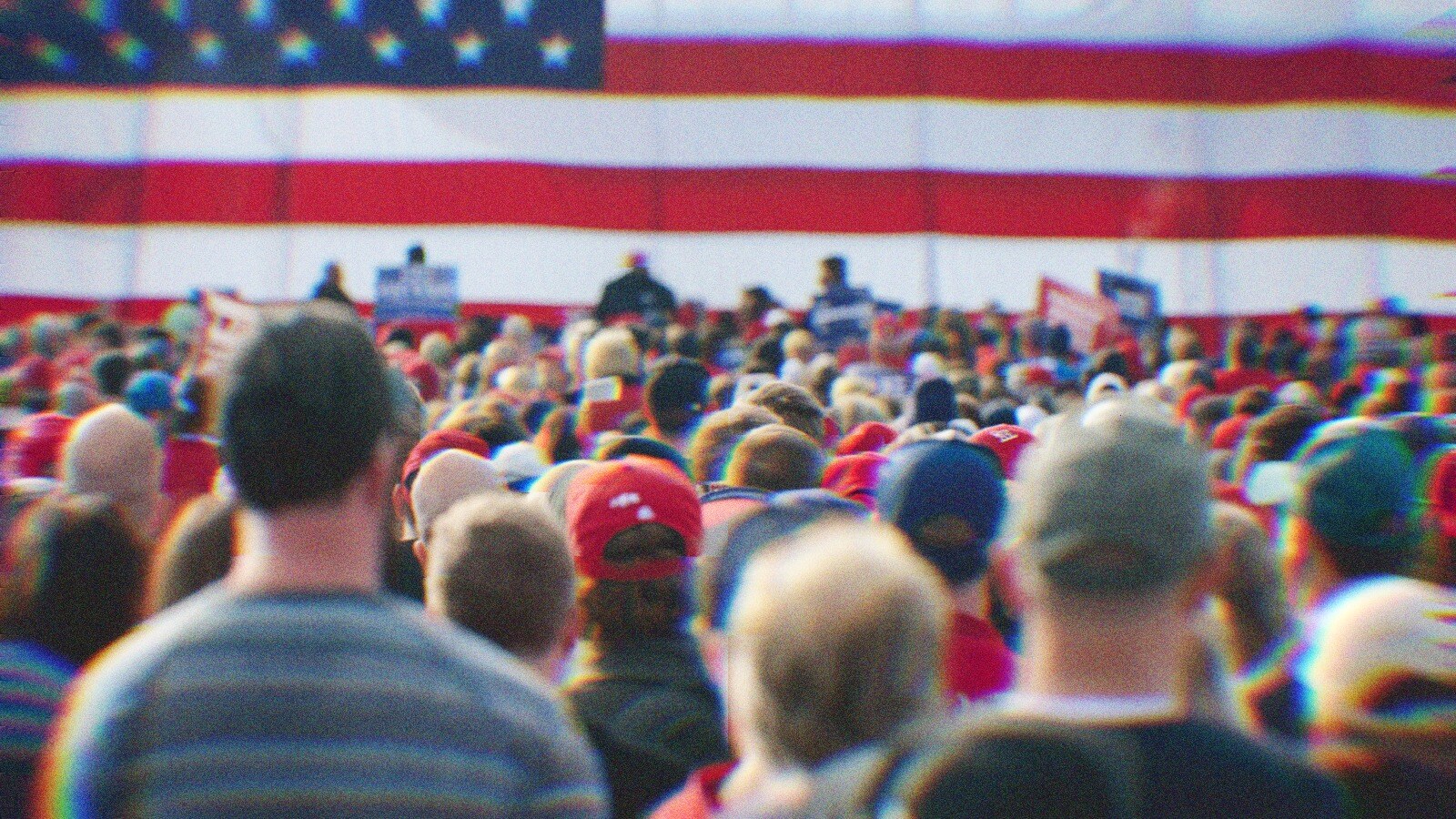Election Backlash.
It’s Neoliberalism, Stupid.
 Image Description: An AI generated image of a political rally.
Image Description: An AI generated image of a political rally.
Vice President Kamala Harris suffered a decisive defeat to Donald Trump this week, marking the Democrats’ second loss in three presidential contests against one of modern history’s most polarizing political figures.
After President Biden’s narrow 2020 victory over Trump—secured during a pandemic that claimed more than 350,000 American lives in its first year—Harris failed to secure a popular vote majority, a first for Democrats in 20 years.
The signs of Trump’s surge in the national vote count were evident, given Republican gains in traditionally Democratic strongholds in recent years, particularly in 2022. Nate Cohn, The New York Times’ polling analyst, had hinted at the possibility of Trump’s potential popular vote victory, with the caveat that Harris could still claim the Electoral College—a reverse of 2016.
The Democrats’ underwhelming performance has prompted calls for an election “autopsy.” However, no one should get excited about the prospects of that happening. Any self-examination would likely enrich the same political consultant class implicated in Democratic electoral failures since 2016. And that’s to say nothing of the undemocratic nature of an internal reckoning, which would most likely exclude the most vocal critics of the party’s impotency (such as the analysis published by Sen. Bernie Sanders on Wednesday).
This year’s defeat echoes 2016’s original sin: Operating under the assumption of Hillary Clinton’s inevitability, the party waged a campaign that emphasized Trump’s controversial behavior and rhetoric rather than addressing widespread economic anxiety. On the surface, the thinking in 2016 wasn’t completely illogical—Trump, viewed as a clownish and unserious figure to many, made xenophobia a hallmark of his campaign, as he slandered immigrants and called for a complete ban on Muslims into the United States. This year, the Harris campaign leaned heavily into fascism, with the nominee parading around with former Rep. Liz Cheney, daughter of Dick Cheney, one of the most reviled former American officials in the country today. Forget the political amnesia one has to have to embrace a war criminal and his hawkish daughter and lionize them as defenders of freedom of democracy—the decision had the unintended effect (we presume) of reminding everyone of the disastrous wars in the Middle East under the Bush-Cheney regime.
In 2016, Clinton’s strategy, born of deep-seated arrogance, proved especially misguided. Many Americans were still grappling with the Great Recession’s aftermath when Trump launched his initial campaign—unemployment didn’t reach pre-recession levels until 2015 and American’s median household income didn’t recover until 2016. People had been burned and were still contending with the effects of the housing collapse, and the Democrats chose ignorance over empathizing with a bruised and battered electorate. If you take Clinton at her word, you can see why: By casting Trump supporters as “deplorables,” she effectively gave away the ballgame—she had no desire to speak to disaffected voters whom she had no respect for. The obvious point here is that Democrats, who are more closely aligned culturally and financially with the “billionaire class,” as Sanders puts it, lacked the ability to truly understand people’s circumstances because voters’ plight was so foreign to them. If people’s struggles weren’t bad enough, President Obama’s deeply unpopular Wall Street bailout proved to be a political albatross.
As the journalist David Sirota observed in 2021: “In a goldfish culture that forgets its entire world every fifteen minutes, we are led to believe that Wall Street was not enthusiastically rewarded for destroying the global economy—and we are asked to forget that the whole grotesque orgy of avarice and corruption ended up setting the conditions for the rise of the Tea Party and then Donald Trump.”
The Great Recession’s political aftershocks reverberated across the ideological spectrum. While the Tea Party emerged on the right, Occupy Wall Street galvanized the left, with dissent spreading from Zuccotti Park in New York City to college campuses nationwide. The oft-fetishized “center” of American politics reacted with outrage to this public display of contempt for big banks. Faced with thousands of everyday people exposing the predatory nature of the capitalist system, the state responded by unleashing militarized police units on defenseless Occupy protesters and threatening journalists with arrest—a hallmark of neoliberal corporate protectionism.
This response was predictable: a political system operating as an extension of the donor class must retaliate with absolute force to maintain its tenuous control. In the decades since the New Deal, America has steadily declined toward democratic insolvency, dismantled through austerity, deregulation, a hollowed-out social safety net, privatized public infrastructure and utilities, the rise of militarized police indistinguishable from imperial forces abroad, and the expansion of the surveillance state.
Crucially, the Democratic establishment misread Obama’s 2012 re-election as an endorsement of the status quo, failing to recognize that Obama was a generational political talent whose coalition would be difficult to recreate.
Worse yet, they attempted to tether Obama’s brand of compassionate neoliberalism to Clinton, a candidate viewed as a war hawk and more of an establishment figure than Obama.
In a sense, Clinton ran as a candidate representing a completely different era of American politics and failed to make a compelling case for moving the country forward beyond simply breaking the glass ceiling—obviously a worthy pursuit. Neoliberalism would prevail, and for it to happen, the person that the political class saw as her greatest impediment, Sanders, had to be stamped out and his supporters relegated to the fringe. The undercutting of Sanders by the Democratic National Committee (DNC), an ostensibly neutral actor, served as an inflection point—one we’re still grappling with today.
Sanders’ acceptance of people’s economic anxieties and his brand of “Democratic socialism” resonated with large swaths of the American public. The working-class coalition he built included some of the same voters Trump is credited with capturing in 2024, including young people and Latino men. In crushing the Sanders movement in 2016, the party handed over the keys of economic populism to Trump, a billionaire who built his empire on the back of his father.
The party’s response to its 2016 defeat proved equally catastrophic. As Russiagate conspiracies became gospel, the establishment successfully deflected attention away from the systemic problems that led to Clinton’s defeat and Trump’s shocking rise—issues that are now well documented.
In 2016, Americans were exhausted—not only from having to scratch and claw their way back financially while Wall Street bailout recipients prospered but also from enduring 16 years of forever wars. Trump became a manifestation of their discontent—a living and breathing middle finger to the entire political system.
No two candidates are the same, and neither are elections. Soon after Harris took up the mantle as the Democratic nominee in the wake of Biden dropping out of the race—a few years too late, according to voter sentiment during his presidency—she struggled to clarify what she stood for. Obama had “Hope” and clearly represented change. Trump, with “Make America Great Again,” was also viewed as someone who would shake up the status quo. Harris was no doubt dragged down by Biden’s abysmal favorability ratings. She also made the fateful decision not to distance herself entirely from Biden. Among her responses when asked how she’d be different than the current president was that she’d install a Republican in her administration.
Harris not only embraced the status quo by running as Biden 2.0, but also abandoned progressive policies that polls show enjoy broad public support. Medicare For All, which she previously endorsed, vanished from her platform. An increased minimum wage—approved even by deep-red Missouri voters this election—was nowhere to be found. Paid family leave became merely a stump speech talking point without substantive policy backing. She overlooked numerous popular progressive policies that appealed across party lines:
By courting Republicans, praising Dick Cheney, and maintaining Biden’s unconditional support for Israel amid the genocide of Palestinians, Harris positioned herself as a defender of neoliberalism—a bankrupt ideology disconnected from working people’s needs. Her DNC speech crystallized this stance when she declared: “As commander in chief, I will ensure America always has the strongest, most lethal fighting force in the world.”
This line, perhaps her most memorable, sparked visceral reactions among generations of Americans who’ve known only endless war, militarized suppression of protests, and horror at Palestinian atrocities. In the context of America’s recent history—torture, rendition, the invasion of Iraq, and borderless, illegal wars—the line, seemingly targeting anti-Trump hawks and defense contractors whose profits have soared since 9/11, alarmed many.
Just as the economic turbulence preceding the 2016 election should have warned Democrats, signs of discontent were equally apparent this time. The Biden administration’s decision to downplay inflation, even as corporations exploited economic chaos to raise prices, likely sealed Democrats’ fate.
The nonprofit Groundwork Collaborative revealed a stark reality early this year: “Corporate profits drove 53 percent of inflation during the second and third quarters of 2023, and more than one-third since the start of the pandemic.”
“This issue has been building for decades through deliberate policy choices,” explained Dr. Rakeen Mabud, Chief Economist and Managing Director of Policy and Research, to News Beat podcast. “Large companies can raise prices and gouge customers because they’ve amassed unprecedented market power. This stems directly from policies allowing these companies to shape the system for their shareholders’ benefit. During crisis moments, they exploit this power.”
As Mabud noted, “greedflation” represents the culmination of neoliberal policies that have surrendered economic control to shareholders. Stock buybacks—once illegal as stock manipulation—now drive everything.
Trump’s second victory—this time with a popular vote mandate—stems from a simple truth: It’s neoliberalism, stupid. Beyond electoral consequences, the ideology perpetuates endless wars, accelerates climate catastrophe, and forces the most economically vulnerable to compete for scraps.
In an era of widening inequality, Democrats could appeal to voters battered by decades of corporatization. The road to victory comes down to simple math. Instead, they’ve chosen to court elites as their path to power.
As Sen. Chuck Schumer declared in 2016: “For every blue-collar Democrat we lose in western Pennsylvania, we will pick up two moderate Republicans in the suburbs in Philadelphia, and you can repeat that in Ohio and Illinois and Wisconsin.”
The donor class is their new blue wall. Tear it down.
Rashed Mian is the managing editor of the award-winning News Beat podcast and co-founder of the newly launched Free The Press (FTP) Substack newsletter. Throughout his career, he has reported on a wide range of issues, with a particular focus on civil liberties, systemic injustice and U.S. hegemony. You can find Rashed on X @rashedmian and on Bluesky @rashedmian.bsky.social.


